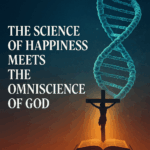“Ponder… with Mary” – Luke 2:19
Introduction: From self-centered to philanthropist
Many of you, I’m sure, will remember the classic 1993 movie “Groundhog Day” starring Bill Murray and Andie McDowell. On February 1, self-centered and sour TV meteorologist Phil Connors, along with news producer Rita and a cameraman, travel from Pittsburgh to Punxsutawney, Pennsylvania, to cover the annual Groundhog Day festivities with Punxsutawney Phil, the Groundhog. Phil Connors wakes up at 6:00 A.M. on Groundhog Day to Sonny & Cher singing, “I’ve got You Babe” on the clock radio. Having grown tired of this assignment, Phil Connors begrudgingly gives his Groundhog Day report during the town’s festival and parade.
After the celebration concludes, a blizzard develops that closes the roads, forcing Phil and his team to stay at the hotel for another night. He awakens the next morning to Sonny & Cher’s “I Got You Babe” playing on the clock radio just as it did the day before. It’s February 2 again, and his day unfolds in exactly the same way, with people doing and saying the same thing as they did the previous day. Phil is the only person who realizes that he is reliving the day. Everyone else seems to be living February 2 for the first time. This episode repeats the following morning and the one after that, and over and over again. Phil’s memories of the “previous” day are intact, but he’s trapped in a seemingly endless time loop, repeating the same day in the same small town. [Come to think of it, that kind of sounds like these last 9 months of Covid days – every day seeming like a repetition of the one before, and the one before that!]
After briefly trying to rationalize his situation, and then thinking he is insane, Phil realizes that his actions have no long-term consequences – he can steal money, drive drunk, smash the alarm clock, kidnap Phil the Groundhog, even commit suicide by electrocuting himself or jumping off a tall building – but the next morning he simply wakes up listening to Sonny & Cher in the same bed, on the same day, over and over again.
He tries to seduce news producer Rita by learning as much as he can about her on a daily basis. He learns what she wants in a man: someone who is humble, kind, generous, courageous, and sensitive; someone who likes children; someone who loves his mother and plays a musical instrument. He learns what she likes and what she doesn’t like and pretends to share her tastes, but she continues to turn down his advances. Finally, he is able to befriend her in a more sincere fashion. He opens his heart to Rita, and her advice helps him to gradually find a goal for his trapped life: to be a benefactor to others. Armed with that renewed purpose, he performs the Heimlich maneuver on a choking man, and saves a little boy who falls from a tree. He also educates himself on a daily basis. So, as the number of Groundhog Days piles up for him, he has enough time to learn how to play jazz piano, speak French, sculpt ice, and memorize the life story of almost everyone in town.
Eventually, Phil sees his own shadow, so to speak, and changes from an inconsiderate, callous egocentric into a thoughtful, kindhearted philanthropist, refining his understanding of human decency, which, in return, makes him an appreciated and beloved man in the town. Phil is able to befriend almost everyone he meets during the day, using his experiences to save lives and help the townspeople. In the process, Rita comes to appreciate him, too. And then, one day, he finds the time loop is broken; it is now February 3. Phil is a different person than he was on February 1. Repeating Groundhog Day over and over again gave him time to ponder what was important in life, and it turned him into a decent kind of person.
1. Theme verb: Ponder
Ponder is our theme verb for the day, and Mary (the mother of Jesus), rather than Bill Murray, is our model and our teacher. Twice in Luke 2, the Bible says that Mary pondered things: once after Jesus’ birth and the visit of the shepherds, and the second time after the episode when Jesus was 12 and he was asking and answering questions with the religious leaders in the temple. But the visit of the angel Gabriel in Luke 1 also gave Mary cause to ponder and reflect and wonder and rejoice at what God was doing in her life. It was not exactly Groundhog Day… maybe the opposite. Instead of repeating a daily routine for Mary, that visit of Gabriel set the whole trajectory of her life on a different path, and it required some thinking, some explaining, some planning.
2. Family – perfect or painful?
When we take the first step into that hallway, temptations are at least three-fold. The first thing we can do is… do nothing. That’s what Elizabeth seems to have done – seclusion, stay hidden. Close the curtains. Shut the doors. Stay put in the hill country of Judea. Block all calls. Ignore text messages and social media posts. Not seek out anyone’s friendship or compassion. When we’re thrust into a difficult situation, it’s tempting to isolate ourselves, curl up into a fetal position
Family. When I say the word family, what comes to mind? How about Norman Rockwell? Norman Rockwell lived from 1894–1978 and became famous for his paintings in a magazine called the Saturday Evening Post.
In perhaps Rockwell’s most iconic Post painting, the grandfather of a family is standing at the head of a dinner table filled with family members. The grandmother is wearing her unsoiled apron, setting the large perfectly browned turkey down on the table. The children and grandchildren are all seated around the table – obedient-looking and rosy-cheeked. Rockwell’s message? This family’s life is absolutely perfect!
When you think about your family, maybe on Christmas evening, what comes to mind? How about this? Dad is snoring on the couch while the TV is blasting away. (Blame it on that sleep inducing enzyme in the turkey!) Mom is a limp dishrag – with a dishrag in her hands – maxed out after another labour-intensive meal. The younger children are fighting again. The adolescent son is locked in his room with the walls shaking to some alien music. And the older daughter? She’s been on the phone so long that it will soon be stuck to her ear.
Family, according to Norman Rockwell, has no hassles, no headaches and is never in hot water. But a real family faces painful and perplexing predicaments. Loved ones die. Children make bad decisions. Parents get divorced. There is never enough money. And who is going to the nursing home this week to visit Grandma? (PAUSE)
3. Mary and the angel Gabriel
I bet Mary, Mary the mother of Jesus – because she appears in the Bible – had a Norman Rockwell family, right? Wrong. Dead wrong.
“In the sixth month the angel Gabriel was sent from God to a city of Galilee named Nazareth, to a virgin betrothed to a man whose name was Joseph, of the house of David. And the virgin’s name was Mary.” Earlier, in Luke 1, the angel Gabriel speaks to Zechariah in the Holy Place, only a few steps away from the Holy of Holies and the very presence of almighty God.
Now this same Gabriel travels to see Mary – far away from the temple in Jerusalem. Mary lives in Nazareth in Galilee, an insignificant town. The divinely chosen Zechariah responds to Gabriel with doubt and hesitation. “How shall I know this? For I am an old man, and my wife is advanced in years.” How will Mary respond to Gabriel? Unlike Zechariah, the qualified and credentialed priest, Mary has no such religious training or status. What will Mary do when confronted by Gabriel, who promises that nothing is impossible with our God?
“The angel said to her, ‘Do not be afraid, Mary, for you have found favor with God. And behold, you will conceive in your womb and bear a son, and you shall call his name Jesus.’” To accent the impossible, Luke accents Mary’s virginity three times. Virgin specifies Mary as a young girl of marriageable age – about thirteen years old. Virgin also describes Mary in the more narrow sexual sense – having had zero sexual experience.
“Mary said to the angel, ‘How will this be, since I am a virgin?’ And the angel answered her, ‘The Holy Spirit will come upon you, and the power of the Most High will overshadow you.’” If Mary’s pregnancy isn’t impossible enough, the explanation is even more impossible! Through the Holy Spirit? Really? Come on! But Mary says, “May it be to me as you have said.” Her response is one of humble trust and absolute obedience.
4. Mary: pondering the message
Then what does Mary do? How does she respond? The Bible tells us in the very next verse, “At that time Mary got ready and left town…” That’s what any straight-thinking, smart, teenage pregnant girl would do. Because… you know… people would start talking, and thinking what a scoundrel Joseph was – forcing a shotgun wedding like that. Or thinking what a scoundrel Mary was – cheating on her husband before they were even married. She needed time to think. What’s our verb today? Ponder!! Yes, that’s what she needed to do – ponder, reflect, figure things out. So she got out of Nazareth and went to visit that relative Elizabeth in her old-age pregnancy. Maybe she went to help Elizabeth. Maybe she just went to think, and Elizabeth might have helped her to make sense of it all.
What did Mary have to ponder? Obviously the visit of Gabriel, and the message of Gabriel. “I am bearing the Son of the Most High God? He will reign over God’s kingdom forever. I’m supposed to call Him Jesus. He is the long-promised Saviour. God is keeping His promise to our father, Abraham. God’s mercy is finally being made known… through me… in me… humble little Mary.” Yes, she had a lot to think about.
Mary was a young woman of faith, for her reply to the angel Gabriel was: “I am the Lord’s servant, let it be to me as you have said.” I am certain that her pondering included prayer. We heard last Sunday that she was encouraged when Elizabeth’s baby – John – leaped in his mother’s womb when Mary greeted her. After three months with Elizabeth, Mary returned home to Nazareth. It was probably at that time that she could no longer hide the truth – emotionally and physically.
Can you imagine teenage Mary going to her twenty-something fiancé Joseph? Joseph starts talking about floor plans and wall colors and Mary interrupts, lightly rubbing her abdomen, “Joseph, sit down. We need to talk. Joseph, honey, I’m pregnant.” So long Norman Rockwell. Houston, we have a problem!
Now, there is a huge difference between our modern rules of engagement and first-century Jewish rules of engagement. Though only engaged, according to Matthew’s Gospel, Joseph was already to be considered Mary’s husband. This same passage uses the word ‘divorce’ to describe the possibility of ending the couple’s engagement. Though they were not yet married, Joseph and Mary were in a binding contract that only death or divorce could terminate.
Upon hearing that Mary is pregnant, Joseph does plan to divorce her. After all, Joseph wasn’t that gullible. It’s clear to Joseph that Mary wasn’t the woman he thought she was. Mary was carrying another man’s child. Joseph doesn’t want to talk about it or work through it. But an angel appeared to Joseph in a dream, and gave him something to ponder. The angel said, “Take Mary as your wife, because the baby is from the Holy Spirit.”
5. Mary: pondering Jesus’ birth (and death)
And so Joseph was in, ALL IN! He took Mary as his wife. They traveled to Bethlehem according to the census decree from Caesar Augustus. Jesus was born there and placed in a manger. Angels announced the birth to the shepherds in the fields. Angel choirs sang God’s glory. And the shepherds came to see this thing that had happened. And Mary pondered some more.
She pondered the last 6 months of her pregnancy, and the trip from Nazareth, and the “no room in the inn” dilemma, and the soft cry of a newborn baby, the Saviour, her Saviour. She had a lot to think about.
There would be even more to think about in the days ahead. Later in Luke 2, while Jesus was still an infant, Joseph and Mary went to offer a sacrifice in the Jerusalem temple, according to Jewish religious rules. There a man named Simeon blessed them, and gave them a curious message about Jesus’ future, and the fact that Mary’s own heart would be pierced with grief. More for her to ponder. Then at the end of Luke 2, after 12 year-old Jesus discussed God-things with the teachers in the temple long after Mary and Joseph had even left Jerusalem, He explained that He must be in His father’s house and about His father’s business. More for Mary to ponder… about her Son.
The beginning of Jesus’ life seemed impossible, but the end of His life, the end of His mission also seemed and looked absolutely impossible. Judas Iscariot betrayed him. Christ’s disciples abandoned him. Peter denied him. The Jews disowned him. Pilate sentenced him. Herod mocked him. Soldiers scourged him and then they crucified him.
But then, Luke writes in Acts 2, “God raised him from the dead, freeing him from the agony of death, because it was impossible for death to keep its hold on him.” What looked like it was completely impossible, God made possible by raising Jesus from the dead! And what does that mean? It means that you are forgiven of ALL your sins. It means that you are God’s child by faith in Jesus. It means that you are loved by the God of the entire universe. It means that God has a place for you with Him, in heaven.
6. Advent: time for you to ponder (and grow)
This Covid year has given us lots to think about, lots to ponder, and lots of time to ponder: What’s really important? What can I do without? How loyal am I – to my place of work, to my family? Where do I put my hope? What is my security in life? Am I a team player? Does my fear rule over my faith? Does worry paralyze me? Oh, yes… lots to ponder.
This Advent season gives us time to ponder, time to think about some really important things in life: Am I self-centered like Phil Connors from the movie? Am I humble like Mary, willing to serve and do what God wants? What is Jesus’ birth really all about? What does it mean? What does it mean to me? Why did Jesus come? Are His death and resurrection true? What do THEY mean? What is God trying to tell me personally right now? How can I find out? How can I get closer to Him? How can I be His servant?
The days of Advent are not going to repeat in a never-ending loop. You aren’t going to wake up day after day to the same Advent song – maybe “O Come, O Come, Emmanuel” – playing on your clock radio. [Do any of you really have clock radios any more? Put up your hands, it won’t be so embarrassing today, because nobody can see you.] Hopefully, Advent has given you the opportunity to change, to grow, to learn, to deepen your faith, to prepare with John, to pray with Zechariah, to praise with Elizabeth, and now to ponder with Mary. This week, the song is going to change. By the end of the week, we’re going to sing, “Joy to the World, the Lord is come!” Jesus is born! He’s the Son of God, born of pondering Mary. He’s your Saviour – crucified and risen from the dead. He’s your Lord and King, ruling over His kingdom which will never end.
He is calling you to ponder deeply in these days. He is calling you to change, and like Mary, to be willing to be His servant and to accept His will and His leading in your life.
Do you think that’s not likely, not possible? It is… remember the angel’s word to pondering Mary: “Nothing is impossible with our God.” Amen.








